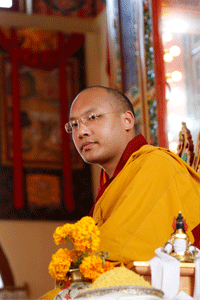27th October – Dorzong Monastery, Gopalpur.
 With the morning light streaming in to the assembly hall from the east, the Gyalwang Karmapa offered teachings in the morning, while in the afternoon, at the special request of His Holiness, the audience had the privilege of receiving teachings on Chöd from His Eminence the 8th Dorzong Rinpoche.
With the morning light streaming in to the assembly hall from the east, the Gyalwang Karmapa offered teachings in the morning, while in the afternoon, at the special request of His Holiness, the audience had the privilege of receiving teachings on Chöd from His Eminence the 8th Dorzong Rinpoche.
His Holiness opened the day with a discussion of the qualities that make disciples worthy recipients of the Dharma. He then resumed the explication of the 8th Gyalwang Karmapa’s guiding instructions for seven-day Chöd retreat. During the second day of the retreat outlined by Mikyo Dorje, the focus is on compassion. In that context, His Holiness explored the distinction between immeasurable compassion and great compassion, while underscoring the need to train in both. Immeasurable compassion refers to the immeasurable number of sentient beings, whereas the greatness of great compassion refers to the fact that not a single being is left out. As such, the focal point is different, the Gyalwang Karmapa explained.
We may cultivate compassion for all beings on this planet, and this would be a form of immeasurable compassion, since there are numberless humans, animals and other sentient beings on this earth. With great compassion, there is a quality of absolute inclusiveness, such that it expands outward to any world where beings have a mind and therefore experience pain and wish for happiness. When we are training in great compassion, we must guard against becoming indifferent to the suffering of any other being. For example, His Holiness observed that we might pass a cage with many chickens crammed into it on the way to slaughter without connecting from the heart with their suffering. If we train first in the mind of definite emergence or “renunciation,” we are effectively training ourselves in compassion for ourselves and developing our ability to genuinely empathize and connect with others who are suffering. To that end, the Gyalwang Karmapa recommended to begin meditating on compassion with specific objects, rather than a nameless, faceless mass of “all sentient beings.” His Holiness particularly stressed the importance of cultivating compassion, because it is the presence of unbearable compassion that makes the “swift path” of tantra swift.
On the third day of the Chöd retreat, the object of meditation is refuge. His Holiness cautioned against confusing “taking refuge” with “going for refuge.” Taking refuge in the sense of pleading and supplicating with an impoverished attitude is not the point. Rather, we go to refuge in order to bolster our desire and commitment to achieve Buddhahood. As such, the Gyalwang Karmapa explained that when we go for refuge, we should understand that we are going to the state of the objects of refuge. The fourth and fifth days of the Chöd retreat are devoted to bodhichitta and the mind that relinquishes body and possessions alike, or tong sem.
To a packed assembly hall, in the second afternoon session His Eminence Dorzong Rinpoche offered a masterful overview of the historical transmission of Chöd in the various lineages of Tibetan Buddhism. Rinpoche went on to cut to the essence of Chod practice, relating it to the nature of mind and the distinction between samsara and nirvana. As Rinpoche taught, he drew on quotes from masters ranging from the great Indian logician Dignaga to Tsangpa Gyare, the founder of the Drukpa Kagyu lineage in which Rinpoche himself is an important lineage holder.
Many audience members commented on the combination of profundity and clarity that marked Rinpoche’s presentation. His excavation of the difference between samsara and nirvana was particularly striking to many. “When we become free of conceptual elaborations, that is nirvana,” Rinpoche stated. “As long as we are apprehending a difference between subject and object, that is samsara.”


